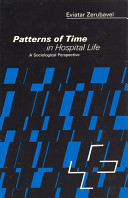
Patterns of Time in Hospital Life: A Sociological Perspective PDF
182 Pages·1979·11.1358 MB·other
Most books are stored in the elastic cloud where traffic is expensive. For this reason, we have a limit on daily download.
Preview Patterns of Time in Hospital Life: A Sociological Perspective
Description:
This volume presents an original study in the sociology of time: a case-description and conceptual analysis of the ways in which the temporal frameworks we customarily take for granted structure social reality. The study is based on the author's observation of the activities of medical professionals in a large teaching hospital: there, he collected data to show that the rhythms of organizational life have particular moral and cognitive dimensions, beyond simple regulative functions. While individuals customarily adapt to a variety of contexts for anchoring events in time, the temporal coordination necessary for collective efforts enforces social controls at multiple levels. This "sociotemporal order," an inherent constituent of social life, offers researchers and theoreticians alike a fresh and rewarding analytic perspective. Patterns of Time will be valued for its several distinctive achievements. Foremost among these is a demonstration of the importance of "temporality" as a topic in its own right. Because measurements of time are a commonplace of social life, sociologists have tended to ignore the significance of temporality as a feature of social organizations. Zerubavel's work is a corrective to this neglect. In addition, the author's imaginative integration of ethnographic description and theoretical analysis bridges the gap between contrasting methods that has characterized much recent sociological and anthropological work. Finally, because of the author's selection of the hospital setting, sociologists of medicine and the professions will find his study useful for its rich and well-observed ethnography, as well as its novel analytical approach.
See more
The list of books you might like
Most books are stored in the elastic cloud where traffic is expensive. For this reason, we have a limit on daily download.
